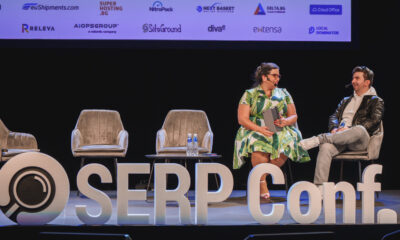TECHNOLOGY
The Power of Developer Community

When developers connect value to customers through what they do, they see the value of responsible artificial intelligence (AI) and their impact on the workforce more clearly.
Development is not just coding and technical training. The work developers do make a difference. Tech solutions impact every part of an organization: HR, finance, marketing, sales and more.
A thriving developer community enables people to visualize how to do things faster and to learn from one other. This ecosystem inspires learning, growing connections, extending capabilities and innovation.
One takeaway from Workday DevCon is that workplace innovation is being redefined. With an aging workforce and rapidly changing technology and business models, modern organizations will rely more and more on internal skills to thrive.
As someone who initially learned to code on my own, I understand the importance of mentorship and curiosity in the development process. That’s why I was thrilled to host Clare Hickie, EMEA CTO at Workday to further explore the power of the developer community.
Clare joined Workday from GSK where she successfully deployed Workday to 120,000 employees across 135 countries, and has been a driving force within Workday for five years. Throughout our conversation, her passion for the Workday platform, as well as the culture and value of people shone brightly. It is inspiring to hear that Clare is investing in championing inspiring tech leaders and women in tech to achieve full advantage.
We started our conversation by addressing the main challenges developers face in driving innovation across HR and finance, and how they can overcome them. Clare highlighted how @Workday enables developers to create solutions seamlessly, with a single security and data model that ensures audit-ability – a crucial aspect when dealing with challenges ranging from security models to maintenance, resources, and governance. Having designed and implemented financial planning applications at global companies, I can truly appreciate the value Workday offers.
We delved into DevCon, exploring the new capabilities and partnerships that Workday developers can leverage. Clare shared some customer success stories, including the rock star Raytheon developer who emphasized meeting business needs with solutions is what truly matters – not just what can be done with tools. I also learned how Otis elevator utilized the Workday platform to build a humanitarian relief application, as well as a volunteer tracking application benefiting 69,000 employees who could assist Ukrainian workers and families in need. Exciting new capabilities such as low/no code functionality of the App Builder were also showcased, illustrating how Workday is lowering the barrier to entry for developers and fostering collaboration with business users.
Workday recently opened its Skills API to the developer community through Workday Extend. This move presents an opportunity to witness innovation skill-oriented advancements within their ecosystem. Developers can quickly tap into new innovations from the public cloud, such as the piloted Amazon Web Services (AWS) AI services showcased at Workday DevCon through Workday Extend. This expanded toolchest of innovations empowers developers to build new capabilities swiftly.
Clare emphasized the significance of explaining Workday’s AI and ML initiatives as part of the core platform. With nearly a decade of experience in this field, Workday is uniquely positioned to deliver AI and ML innovation, bring business resiliency, adaptability, and competitive advantage to their customers. Their uniform data model, which provides a large volume of clear and coherent data for training machine learning models, combined with platform approach, enables engineers and developers to be highly productive without the need for building one-off feathers. Workday delivers AI responsibly, prioritizing transparency, security, and a human centric approach. Just as they keep their customers’ most crucial data – people and financial information secure and protected, they apply the same trustworthy approach to AI and ML.
Clare also highlighted the excitement surrounding the DevCon hackathon where remarkable achievements were made in just 24 hours. PwC won the “Best in Show” award by building an app that saves time by using AI algorithms to identify relevant skills based on job descriptions and translating them into multiple languages and automatically posting it on career sites. Deloitte, on the other hand, won the “People’s Choice Award” with their chatbot that provides sentiment analysis and leverages AI and ML to suggest action plans for individual skill developers. These examples demonstrate the incredible potential of developers and their ability to create meaningful solutions.
Clare stressed the importance of sponsorship, mentorship and building connections within the developer community. She encouraged women developers to join internal and external communities and She herself actively sponsors Women in Tech in Dublin while engaging with T200, fostering collaboration, and advancing women’s leadership in technology.
The developer community at Workday thrives on a strong culture and core values, which serve as the foundation for engaging with developers, partners, and customers. By enabling developers to build innovation solutions quickly, fostering collaboration with business users, embracing AI and ML, and investing in developer empowerment, Workday drives workplace innovation that solves real-world problems, optimizes efficiency, and enhances user experience. The power of the developer community lies in its ability to build a ship that enables everyone to cross the ocean and thrive on the other side, where the best of workplace innovation awaits.
Watch the full interview here:
TECHNOLOGY
Next-gen chips, Amazon Q, and speedy S3

AWS re:Invent, which has been taking place from November 27 and runs to December 1, has had its usual plethora of announcements: a total of 21 at time of print.
Perhaps not surprisingly, given the huge potential impact of generative AI – ChatGPT officially turns one year old today – a lot of focus has been on the AI side for AWS’ announcements, including a major partnership inked with NVIDIA across infrastructure, software, and services.
Yet there has been plenty more announced at the Las Vegas jamboree besides. Here, CloudTech rounds up the best of the rest:
Next-generation chips
This was the other major AI-focused announcement at re:Invent: the launch of two new chips, AWS Graviton4 and AWS Trainium2, for training and running AI and machine learning (ML) models, among other customer workloads. Graviton4 shapes up against its predecessor with 30% better compute performance, 50% more cores and 75% more memory bandwidth, while Trainium2 delivers up to four times faster training than before and will be able to be deployed in EC2 UltraClusters of up to 100,000 chips.
The EC2 UltraClusters are designed to ‘deliver the highest performance, most energy efficient AI model training infrastructure in the cloud’, as AWS puts it. With it, customers will be able to train large language models in ‘a fraction of the time’, as well as double energy efficiency.
As ever, AWS offers customers who are already utilising these tools. Databricks, Epic and SAP are among the companies cited as using the new AWS-designed chips.
Zero-ETL integrations
AWS announced new Amazon Aurora PostgreSQL, Amazon DynamoDB, and Amazon Relational Database Services (Amazon RDS) for MySQL integrations with Amazon Redshift, AWS’ cloud data warehouse. The zero-ETL integrations – eliminating the need to build ETL (extract, transform, load) data pipelines – make it easier to connect and analyse transactional data across various relational and non-relational databases in Amazon Redshift.
A simple example of how zero-ETL functions can be seen is in a hypothetical company which stores transactional data – time of transaction, items bought, where the transaction occurred – in a relational database, but use another analytics tool to analyse data in a non-relational database. To connect it all up, companies would previously have to construct ETL data pipelines which are a time and money sink.
The latest integrations “build on AWS’s zero-ETL foundation… so customers can quickly and easily connect all of their data, no matter where it lives,” the company said.
Amazon S3 Express One Zone
AWS announced the general availability of Amazon S3 Express One Zone, a new storage class purpose-built for customers’ most frequently-accessed data. Data access speed is up to 10 times faster and request costs up to 50% lower than standard S3. Companies can also opt to collocate their Amazon S3 Express One Zone data in the same availability zone as their compute resources.
Companies and partners who are using Amazon S3 Express One Zone include ChaosSearch, Cloudera, and Pinterest.
Amazon Q
A new product, and an interesting pivot, again with generative AI at its core. Amazon Q was announced as a ‘new type of generative AI-powered assistant’ which can be tailored to a customer’s business. “Customers can get fast, relevant answers to pressing questions, generate content, and take actions – all informed by a customer’s information repositories, code, and enterprise systems,” AWS added. The service also can assist companies building on AWS, as well as companies using AWS applications for business intelligence, contact centres, and supply chain management.
Customers cited as early adopters include Accenture, BMW and Wunderkind.
Want to learn more about cybersecurity and the cloud from industry leaders? Check out Cyber Security & Cloud Expo taking place in Amsterdam, California, and London. Explore other upcoming enterprise technology events and webinars powered by TechForge here.
TECHNOLOGY
HCLTech and Cisco create collaborative hybrid workplaces

Digital comms specialist Cisco and global tech firm HCLTech have teamed up to launch Meeting-Rooms-as-a-Service (MRaaS).
Available on a subscription model, this solution modernises legacy meeting rooms and enables users to join meetings from any meeting solution provider using Webex devices.
The MRaaS solution helps enterprises simplify the design, implementation and maintenance of integrated meeting rooms, enabling seamless collaboration for their globally distributed hybrid workforces.
Rakshit Ghura, senior VP and Global head of digital workplace services, HCLTech, said: “MRaaS combines our consulting and managed services expertise with Cisco’s proficiency in Webex devices to change the way employees conceptualise, organise and interact in a collaborative environment for a modern hybrid work model.
“The common vision of our partnership is to elevate the collaboration experience at work and drive productivity through modern meeting rooms.”
Alexandra Zagury, VP of partner managed and as-a-Service Sales at Cisco, said: “Our partnership with HCLTech helps our clients transform their offices through cost-effective managed services that support the ongoing evolution of workspaces.
“As we reimagine the modern office, we are making it easier to support collaboration and productivity among workers, whether they are in the office or elsewhere.”
Cisco’s Webex collaboration devices harness the power of artificial intelligence to offer intuitive, seamless collaboration experiences, enabling meeting rooms with smart features such as meeting zones, intelligent people framing, optimised attendee audio and background noise removal, among others.
Want to learn more about cybersecurity and the cloud from industry leaders? Check out Cyber Security & Cloud Expo taking place in Amsterdam, California, and London. Explore other upcoming enterprise technology events and webinars powered by TechForge here.
TECHNOLOGY
Canonical releases low-touch private cloud MicroCloud

Canonical has announced the general availability of MicroCloud, a low-touch, open source cloud solution. MicroCloud is part of Canonical’s growing cloud infrastructure portfolio.
It is purpose-built for scalable clusters and edge deployments for all types of enterprises. It is designed with simplicity, security and automation in mind, minimising the time and effort to both deploy and maintain it. Conveniently, enterprise support for MicroCloud is offered as part of Canonical’s Ubuntu Pro subscription, with several support tiers available, and priced per node.
MicroClouds are optimised for repeatable and reliable remote deployments. A single command initiates the orchestration and clustering of various components with minimal involvement by the user, resulting in a fully functional cloud within minutes. This simplified deployment process significantly reduces the barrier to entry, putting a production-grade cloud at everyone’s fingertips.
Juan Manuel Ventura, head of architectures & technologies at Spindox, said: “Cloud computing is not only about technology, it’s the beating heart of any modern industrial transformation, driving agility and innovation. Our mission is to provide our customers with the most effective ways to innovate and bring value; having a complexity-free cloud infrastructure is one important piece of that puzzle. With MicroCloud, the focus shifts away from struggling with cloud operations to solving real business challenges” says
In addition to seamless deployment, MicroCloud prioritises security and ease of maintenance. All MicroCloud components are built with strict confinement for increased security, with over-the-air transactional updates that preserve data and roll back on errors automatically. Upgrades to newer versions are handled automatically and without downtime, with the mechanisms to hold or schedule them as needed.
With this approach, MicroCloud caters to both on-premise clouds but also edge deployments at remote locations, allowing organisations to use the same infrastructure primitives and services wherever they are needed. It is suitable for business-in-branch office locations or industrial use inside a factory, as well as distributed locations where the focus is on replicability and unattended operations.
Cedric Gegout, VP of product at Canonical, said: “As data becomes more distributed, the infrastructure has to follow. Cloud computing is now distributed, spanning across data centres, far and near edge computing appliances. MicroCloud is our answer to that.
“By packaging known infrastructure primitives in a portable and unattended way, we are delivering a simpler, more prescriptive cloud experience that makes zero-ops a reality for many Industries.“
MicroCloud’s lightweight architecture makes it usable on both commodity and high-end hardware, with several ways to further reduce its footprint depending on your workload needs. In addition to the standard Ubuntu Server or Desktop, MicroClouds can be run on Ubuntu Core – a lightweight OS optimised for the edge. With Ubuntu Core, MicroClouds are a perfect solution for far-edge locations with limited computing capabilities. Users can choose to run their workloads using Kubernetes or via system containers. System containers based on LXD behave similarly to traditional VMs but consume fewer resources while providing bare-metal performance.
Coupled with Canonical’s Ubuntu Pro + Support subscription, MicroCloud users can benefit from an enterprise-grade open source cloud solution that is fully supported and with better economics. An Ubuntu Pro subscription offers security maintenance for the broadest collection of open-source software available from a single vendor today. It covers over 30k packages with a consistent security maintenance commitment, and additional features such as kernel livepatch, systems management at scale, certified compliance and hardening profiles enabling easy adoption for enterprises. With per-node pricing and no hidden fees, customers can rest assured that their environment is secure and supported without the expensive price tag typically associated with cloud solutions.
Want to learn more about cybersecurity and the cloud from industry leaders? Check out Cyber Security & Cloud Expo taking place in Amsterdam, California, and London. Explore other upcoming enterprise technology events and webinars powered by TechForge here.
-

 SEARCHENGINES6 days ago
SEARCHENGINES6 days agoGoogle Needs Very Few Links To Rank Pages; Links Are Less Important
-

 PPC5 days ago
PPC5 days ago10 Most Effective Franchise Marketing Strategies
-

 PPC6 days ago
PPC6 days agoBiggest Trends, Challenges, & Strategies for Success
-

 SEO6 days ago
SEO6 days agoHow to Become an SEO Lead (10 Tips That Advanced My Career)
-

 MARKETING6 days ago
MARKETING6 days agoHow to Use AI For a More Effective Social Media Strategy, According to Ross Simmonds
-

 SEARCHENGINES4 days ago
SEARCHENGINES4 days agoGoogle Won’t Change The 301 Signals For Ranking & SEO
-

 SEARCHENGINES5 days ago
SEARCHENGINES5 days agoGoogle Again Says Ignore Link Spam Especially To 404 Pages
-

 SEO3 days ago
SEO3 days agobrightonSEO Live Blog















